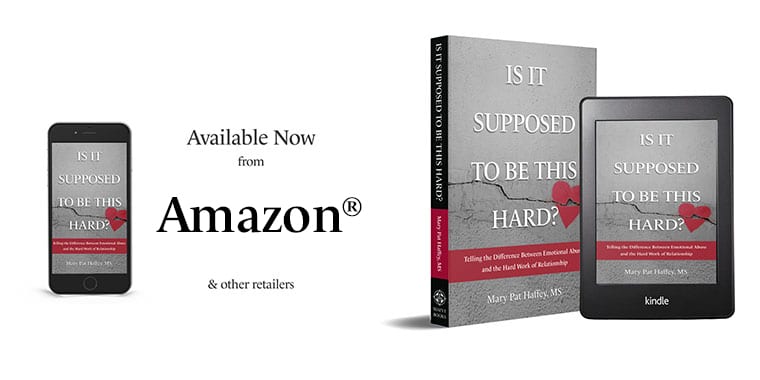Once abused people can’t deny their anger any longer, they often have an internal struggle trying to reconcile anger with their self-image as a kind, loving person. Terri shared a journal entry about the psycho-spiritual identity crisis her anger engendered:
Anger, My Friend. It is my anger that gave me power. When I finally stopped trying to quell my anger—when it got too strong for me to quell anymore, it became a productive force because it spurred me to respond to the circumstances that created the anger in the first place. When I allowed it to work, it made me strong enough to set parameters and change my circumstances.
One of the things I’ve been asking myself is, “Why did I stay?” Part of the answer is that I would not be instructed by my anger. Rather than see it as a sign, a friend with advice to give, I saw it as an evil to overcome.
Being angry, living with it, walking with it, responding to it, at first seemed very, very wrong, but alas, I had no choice because it had grown much, much stronger than I. I had to drop all my attempts at being loving and forgiving and depend on the mercy of God. I had to admit that I was no spiritual master. I was not nearly virtuous or heroic enough to overcome the anger I felt. I went with this anger because I believed to do otherwise would be to allow myself to be destroyed. I had to do what I had to do to save myself. And now I realize that Anger, My Friend, has initiated the changes to the situation that gave rise to the anger to begin with.
Healthy anger is a profound act of self-love that honors the sanctity and integrity of the self enough to protect it against the degradation inherent in abuse.
Sometimes, when people who have been passive in the face of abuse finally allow themselves to feel and act on their anger, they let the pendulum swing too far into aggression:
I didn’t know how to be appropriately angry. So when I finally became angry, the rage was over the top. It was like all the experiences of anger that had been suppressed became this blinding rage, which was inappropriate.
—Paola
For those who self-identify as empathic, compassionate, loving people, acting out with aggressive anger feels contrary to their nature:
I don’t want to become the person who has to rage and shout and overpower people. That doesn’t feel good to me. My mother was a shouter, a rager. I was afraid that would become a habit.
—Samantha
Part of healing from abuse is learning how to be true to that core identity of being a compassionate person while still honoring the self-protective force of healthy anger. When people know how to do that, they have become compassionate warriors.
BECOMING A COMPASSIONATE WARRIOR
Compassionate warriors are people who have learned to balance the force of healthy anger with their desire to be kind individuals.
- Compassionate warriors use protective anger to detach from the abuser without the need to demean, diminish, or punish them.
- Compassionate warriors use the motivating force of healthy anger to change themselves without expecting change from the abuser.
- Compassionate warriors use protective anger to fortify their boundaries and hold them with conviction. Their goal is to reclaim their power without disempowering another, although abusers will object to losing their abusive power and control.
- Compassionate warriors use healthy anger to hold abusers accountable for their actions. They do not compromise their boundaries because the abuser doesn’t like them.
- Compassionate warriors use the motivating force of healthy anger to propel them forward as they step away from abuse and toward their own safety, health, and growth.
- Compassionate warriors are self-forgiving when they fail to hold boundaries as firmly as they want or when they overstep by acting more aggressively than they would like. They apologize if necessary, regroup, and move on with resolve to do better next time.
While compassionate warriors initially use anger to feel strong, they don’t need anger to stay strong. Compassionate warriors eventually feel empowered enough that their anger is relegated to its rightful function as an alert that a boundary is being violated and they need to take self-protective action, whether that means verbal expression to enforce the boundary, removing themselves from a situation, or taking any other healthy actions they need to take.
